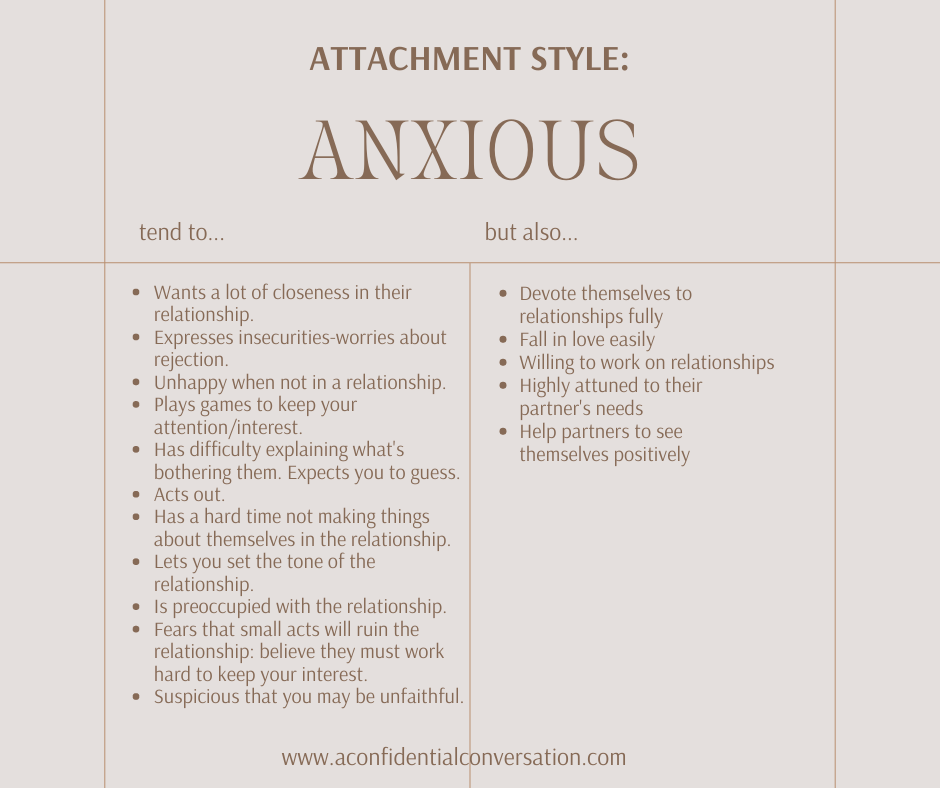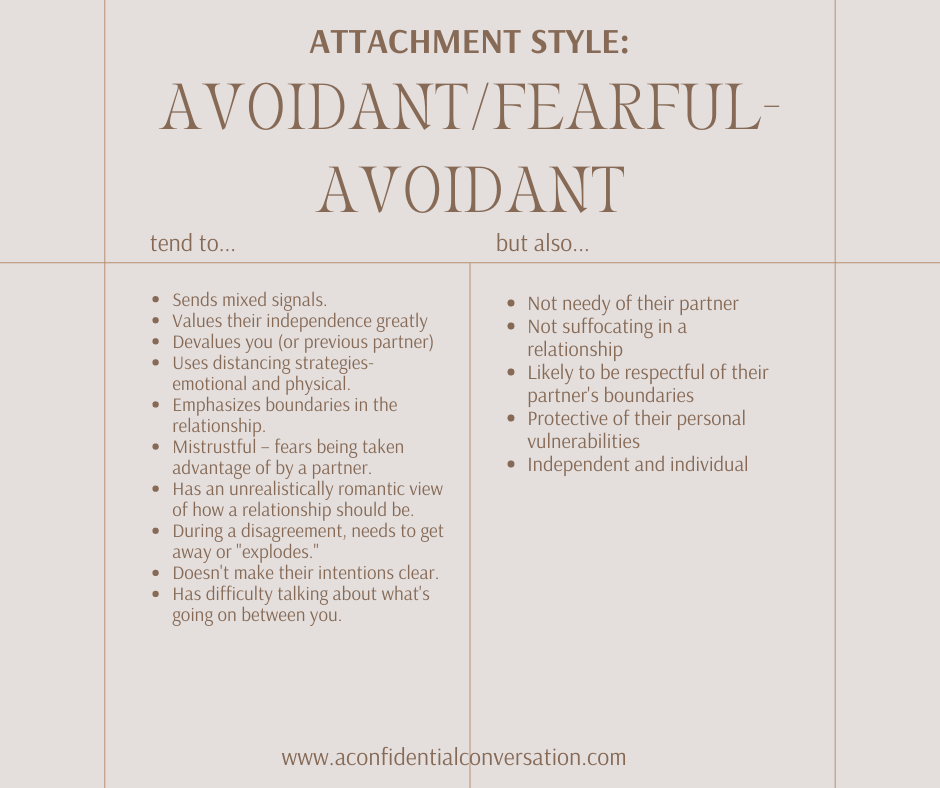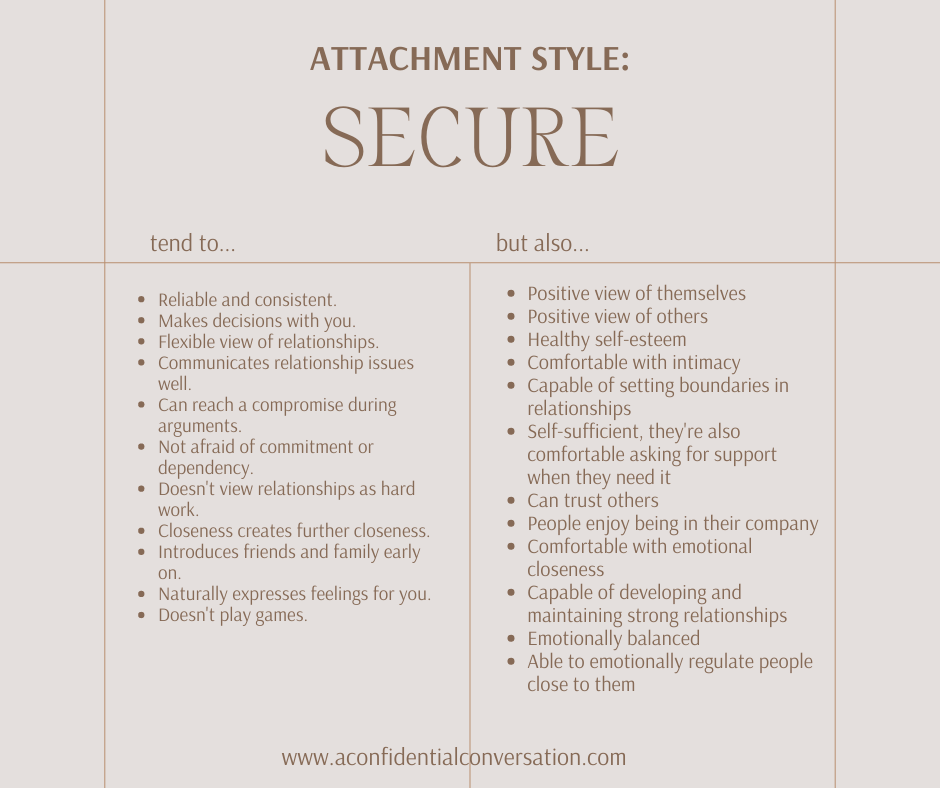Characteristics of Attachment Styles in Relationships
Aug 15, 2022
Recently we discussed the four attachment styles. Each style has its own characteristics and traits. Therefore, you may not entirely fit into one type exactly. Here are some examples of how each type can be in a relationship.
Anxious:
- Wants a lot of closeness in their relationship.
- Expresses insecurities-worries about rejection.
- Unhappy when not in a relationship.
- Plays games to keep your attention/interest.
- Has difficulty explaining what's bothering them. Expects you to guess.
- Acts out.
- Has a hard time not making things about themselves in the relationship.
- Lets you set the tone of the relationship.
- Is preoccupied with the relationship.
- Fears that small acts will ruin the relationship: believe they must work hard to keep your interest.
- Suspicious that you may be unfaithful.

Avoidant:
- Sends mixed signals.
- Values their independence greatly
- Devalues you (or previous partner)
- Uses distancing strategies-emotional and physical.
- Emphasizes boundaries in the relationship.
- Mistrustful – fears being taken advantage of by a partner.
- Has an unrealistically romantic view of how a relationship should be.
- During a disagreement, needs to get away or "explodes."
- Doesn't make their intentions clear.
- Has difficulty talking about what's going on between you.

Secure:
- Reliable and consistent.
- Makes decisions with you.
- Flexible view of relationships.
- Communicates relationship issues well.
- Can reach a compromise during arguments.
- Not afraid of commitment or dependency.
- Doesn't view relationships as hard work.
- Closeness creates further closeness.
- Introduces friends and family early on.
- Naturally expresses feelings for you.
- Doesn't play games.

Anything resonating with you so far about yourself? Your partner?
There are many strong traits too of these attachment styles.
Anxious:
- Devote themselves to relationships fully
- Fall in love easily
- Willing to work on relationships
- Highly attuned to their partner's needs
- Help partners to see themselves positively
Avoidant:
- Not needy of their partner
- Not suffocating in a relationship
- Likely to be respectful of their partner's boundaries
- Protective of their personal vulnerabilities
- Independent and individual
Secure:
- Positive view of themselves
- Positive view of others
- Healthy self-esteem
- Comfortable with intimacy
- Capable of setting boundaries in relationships
- Self-sufficient, they're also comfortable asking for support when they need it
- Can trust others
- People enjoy being in their company
- Comfortable with emotional closeness
- Capable of developing and maintaining strong relationships
- Emotionally balanced
- Able to emotionally regulate people close to them
What can you do to heal?
- Determine whether you or your partner are seeking intimacy and closeness.
- Assess how preoccupied you or they are with the relationship and how sensitive you or they are to rejection.
- Don't rely on one "symptom," look for various signs.
- Assess your or their reaction to effective communication.
Effective communication works on the understanding all have particular needs in a relationship, many of which are determined by your attachment style. They aren't good or bad; they simply are what they are. For example, if you're anxious, you have a strong need for closeness and must be reassured at all times that your partner loves and respects you. On the other hand, if you're avoidant, you need to maintain some distance, either emotional or physical, from your partner and preserve a significant degree of separateness. In order to be happy in a relationship, we need to find a way to communicate our attachment styles needs clearly without resorting to attacks or defensiveness.
The benefits of Effective Communication will help you:
- Choose the right partner to ensure your needs are getting met in the relationship, whether it's a new one or an existing one.
- Listen and look for what you or they are not saying or doing.
Understanding your attachment style is essential to help improve your self-awareness and enhance your relationships. As a Love Coach, it's necessary to offer various tools and techniques to assist in the process. Please visit my website and take my Love Assessment to find out where you are in the process of love.
Do you like this content? Are we the right fit? Let's get to know each other with a 30 minute chat.
Stay connected with news and updates!
Join our mailing list to receive the latest news and updates from our team.
Don't worry, your information will not be shared.
We hate SPAM. We will never sell your information, for any reason.

